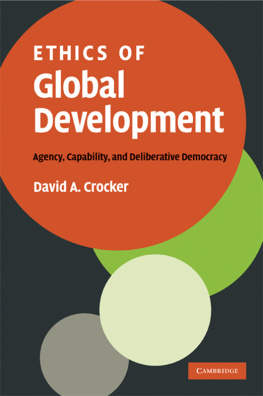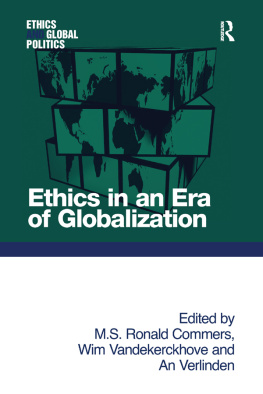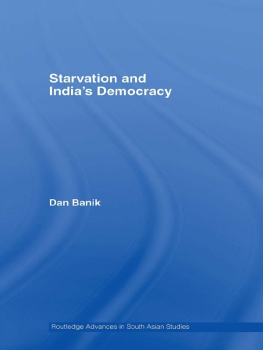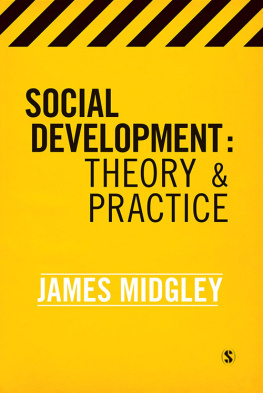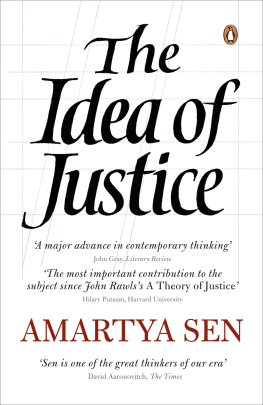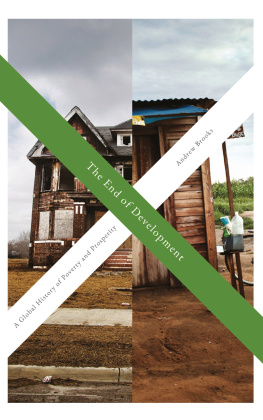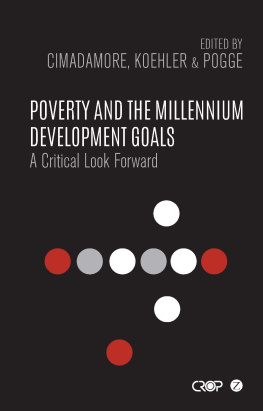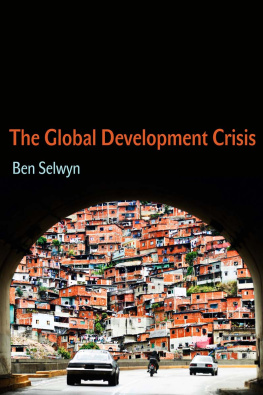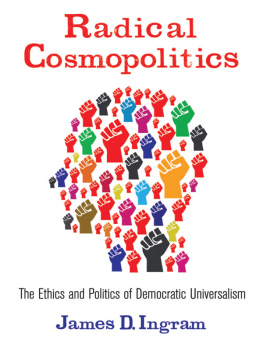Ethics of Global Development
Poverty, inequality, violence, environmental degradation, and tyranny continue to afflict the world. Ethics of Global Development offers moral reflection on the ends and means of local, national, and global efforts to overcome these five scourges. After emphasizing the role of ethics in development studies, policymaking, and practice, David A. Crocker analyzes and evaluates Amartya Sens philosophy of development in relation to alternative ethical outlooks. He argues that Sens recent turn to robust ideals of human agency and democracy improves on both Sens earlier emphasis on capabilities and functionings and Martha Nussbaums version of the capability orientation. This agencyfocused capability approach is then extended and strengthened by applying it to the challenges of consumerism and hunger, the development responsibilities of affluent individuals and nations, and the dilemmas of globalization. Throughout the book the author argues for the importance of more inclusive and deliberative democratic institutions.
David A. Crocker is Senior Research Scholar at the Institute for Philosophy and Public Policy and the School of Public Policy at the University of Maryland. He is an officer of the Human Development and Capability Association, and was founder and former president of the International Development Ethics Association (IDEA).
Ethics of Global Development
Agency, Capability, and Deliberative Democracy
David A. Crocker

CAMBRIDGE UNIVERSITY PRESS
Cambridge, New York, Melbourne, Madrid, Cape Town, Singapore, So Paulo, Delhi
Cambridge University Press
The Edinburgh Building, Cambridge CB2 8RU, UK
Published in the United States of America by Cambridge University Press, New York
www.cambridge.org
Information on this title: www.cambridge.org/9780521885195
David A. Crocker 2008
This publication is in copyright. Subject to statutory exceptionand to the provisions of relevant collective licensing agreements,no reproduction of any part may take place withoutthe written permission of Cambridge University Press.
First published 2008
A catalogue record for this publication is available from the British Library
Library of Congress CataloginginPublication Data
Crocker, David A.
Ethics of global development: agency, capability, and deliberative democracy / David A. Crocker.
p.cm.
Includes index.
1. Economic development Moral and ethical aspects.2. Social planning Moral and ethical aspects. I. Title.
HD75.C76 2008
174dc22
2008007230
ISBN 9780521885195 hardback
Cambridge University Press has no responsibilityfor the persistence or accuracy of URLs for external or thirdparty internet websites referred to in this book, and does not guarantee that any content on such websites is, or will remain, accurate or appropriate.
To Cathy, Amanda, and Davey
Anna, Julia, and Luke
Philosophy recovers itself when it ceases to be a device for dealing with the problems of philosophers and becomes a method, cultivated by philosophers, for dealing with the problems of men.
John Dewey, The Need for Recovery of Philosophy, 1917
In terms of the medieval distinction between the patient and the agent, this freedomcentered understanding of economics and of the process of development is very much an agentoriented view. With adequate social opportunities, individuals can effectively shape their own destiny and help each other. They need not be seen primarily as passive recipients of the benefits of cunning development programs. There is indeed a strong rationale for recognizing the positive role of free and sustainable agency and even of constructive impatience.
Amartya Sen, Development as Freedom, 1999
There are, we have argued, rich lessons here [in the developmental challenges faced in India], which cannot be seized without taking interest in the ends and means of development in general and in the intrinsic value, constructive role and instrumental importance of public participation in particular. The basic approach involves an overarching interest in the role of human beings on their own and in cooperation with each other in running their own lives and in using and expanding their freedoms.
Jean Drze and Amartya Sen, India: Development and Participation, 2nd edn., 2002
Part I
Development ethics
Part II
The capability approach: ethical foundations
Part III
Strengthening and applying the capability approach
Part IV
Deliberative democracy, participation, and globalization
1 Introduction
This volume is a work in global development ethics. It explains, justifies, applies, and extends ethical reflection on development goals, policies, projects, and institutions from the local to the global level.globalization. Although at least portions of seven chapters appeared as earlier versions, I have revised often radically each of them to take account of recent literature, reflect changes in my thinking over the last fifteen years, respond to criticism of earlier work, and yield what I hope is a new and harmonious totality.
Central to each of the books four parts and eleven chapters is my sympathetic and, at times, critical engagement with development.
Much of my work since 1990 also has been a response to
To introduce the book as a whole, in this introductory chapter I weave together my own intellectual journey, what I understand to be the evolving stages of development ethics, and the rationale for the volumes four Parts and ten remaining chapters. Other development ethicists, such as Sabina Alkire, Nigel Dower, Jay Drydyk, Des Gasper, Denis Goulet, Martha Nussbaum, Onora ONeill, and Stephen Schwenke would tell different personal stories and provide somewhat different accounts of the evolution of development ethics. My personal trajectory is only one of the ways development ethics has evolved. For example, some development ethicists have not engaged Sens capability approach or have done so in ways that differ from my own.
Toward development ethics
In the spring of 1978, two out of graduate school. The two colleagues came with good news and bad news.
The good news was that they had just received a twoyear grant from the
The bad news was that these colleagues wanted me to teach the course. Although flattered by the offer and attracted by the promise of a stipend, I responded incredulously. Youve got the wrong guy. I knew nothing, I said, of rural life and mountain towns (except ski towns like Steamboat Springs). And my experience in the developing world was limited to a year in the early 1960s working with impoverished youth in Clevelands inner city and to a whirlwind family vacation in the early 1970s to Guaymas, Mexico. Specializing in philosophical ethics, metaethics, and AngloAmerican and European socialpolitical philosophy hardly qualified me to teach the course they proposed. My intellectual interests focused on the theories of justice of What did such philosophical views have to do with rural development whatever that was at home or abroad or with what were then dubbed Third World issues? I had my hands full trying to contribute to a dialogue between AngloAmerican and European social philosophy.
My two colleagues, however, persisted. Dont worry (about your qualifications); you will teamteach the course with two other CSU professors an expert on India, who for several years has lived in India and Iran, and a professor of animal science, who has USAIDfunded projects throughout the developing world.moral relativism? Is my development work contributing to a tyrannys legitimacy or to excessive US influence? How should we define development and how should we try to promote it? Who should answer these questions, what methods should they use, and what should they say?
Next page
